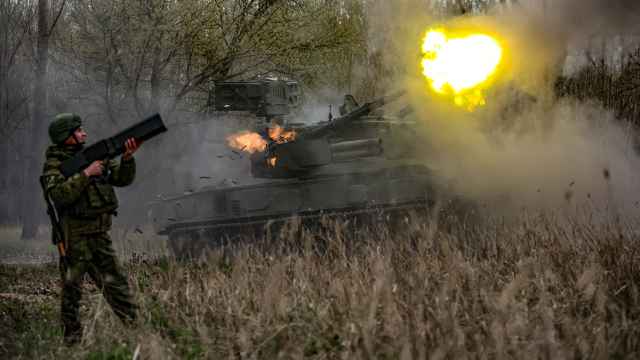Lowering the social tax is necessary for business growth, will reduce "gray" economic activities and will facilitate more investment, experts and entrepreneurs said Thursday.
The social tax was raised from 26 percent to 34 percent in the beginning of this year to fund pension and health care systems and help close the budget deficit.
"The effect of lowering the tax is simply that many companies would survive," said Vladislav Korochkin, vice president of Opora Russia, a small and midsized business association. "There will be further development, stability."
President Dmitry Medvedev said Wednesday that the tax rate should be returned to previous levels because the current rate may be "unbearable" for many types of business, Bloomberg reported.
The increase is stifling business growth, which is already suffering under price increases of electricity and other utilities.
Large companies are seeing profits drop, while small companies face a choice of closing or "going into the shadows," Korochkin said — which means using shady business practices such as paying employees off the books or not declaring all profits.
Business Russia estimates that about 50 percent of small and midsized businesses took this less-than-legal route to avoid paying the additional tax, chairman Boris Titov said.
The tax is a catastrophe for small businesses, said Igor Vecherov, director of Kazan's Khimgrad industrial park and a member of a local small business association.
"Everyone is trying to survive," Vecherov said. "I guarantee that everyone — all accountants, all business owners — are working on schemes not to pay this tax." He declined to elaborate on what the schemes are.
With the "wild 90s" long-forgotten, employing such practices is nearly impossible for large companies, UralSib head economist Alexei Devyatov said. Large companies, including UralSib, have simply been paying more.
Moving businesses to tax-free offshore zones like Cyprus is another tactic companies are using, said Vladimir Vinogradov, chairman of Opora's Omsk branch. But new legislation currently in the works will make offshore activities more difficult by increasing the government's investigative capacities.
Omsk is a region particularly hard-hit by the tax because of its remoteness. Its close proximity to Kazakhstan, where taxes are significantly lower, has enticed many business owners to move their enterprises across the border.
Salaries and corporate investment have also suffered this year, partly due to the greater tax burden. According to the State Statistics Service, investment declined 4.7 percent in January and 0.4 percent in February, year on year.
Paychecks decreased 5.8 percent in January and 1.5 percent in February, year on year.
Small businesses will support the president's effort to lower the tax, while the Finance Ministry will do anything it can to keep it at 34 percent, Devyatov said.
The Finance Ministry did not comment in time for this article.
Prime Minister Vladimir Putin said returning to the 26 percent tax could mean 400 billion rubles ($14 billion) to 800 billion rubles ($29 billion) less revenue for the federal budget, Bloomberg reported.
But Devyatov said oil prices are high and should be sufficient to keep the state coffers full.
Large companies also want the tax to decrease. Renault Russia spokeswoman Yekaterina Tretyakova said her company fully supports the president's initiative to lower the tax.
Business and analysts agree that reducing the tax to last year's 26 percent level would increase competitiveness of Russian business domestically and abroad. They agree that in a country with so much administrative red tape, the tax added yet another hurdle for business operations. The money companies will save thanks to the decreased tax will most likely go to business development and investment in new technologies, business owners said.
But for some businesses, the problem is especially acute.
"The decrease will only take effect next year, but we have to somehow survive until then," Khimgrad's Vecherov said.
A Message from The Moscow Times:
Dear readers,
We are facing unprecedented challenges. Russia's Prosecutor General's Office has designated The Moscow Times as an "undesirable" organization, criminalizing our work and putting our staff at risk of prosecution. This follows our earlier unjust labeling as a "foreign agent."
These actions are direct attempts to silence independent journalism in Russia. The authorities claim our work "discredits the decisions of the Russian leadership." We see things differently: we strive to provide accurate, unbiased reporting on Russia.
We, the journalists of The Moscow Times, refuse to be silenced. But to continue our work, we need your help.
Your support, no matter how small, makes a world of difference. If you can, please support us monthly starting from just $2. It's quick to set up, and every contribution makes a significant impact.
By supporting The Moscow Times, you're defending open, independent journalism in the face of repression. Thank you for standing with us.
Remind me later.





